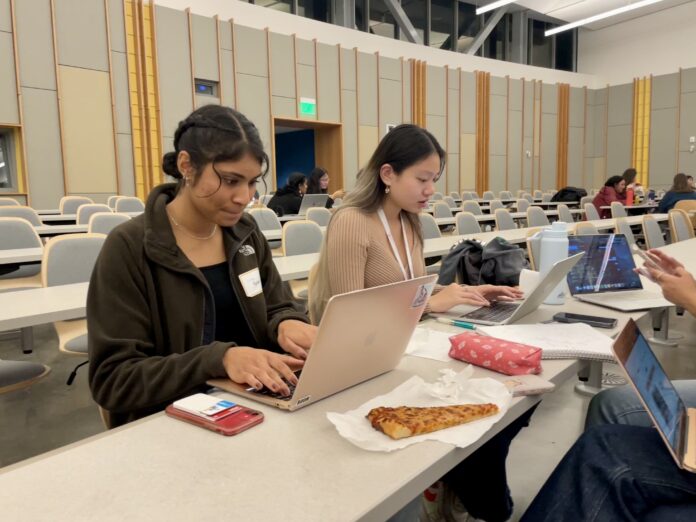Girls Who Code hosts beginner-friendly hackathon focused on sustainability and student life
By SONORA SLATER — science@theaggie.org
“This is my first hackathon,” first-year data science major Varshini Peddinti said with an excited smile, sitting in California Hall on a rainy Friday night waiting to participate in the HerHacks hackathon. She wasn’t alone in the sentiment — in fact, it was echoed by many of the nearly 100 attendees of UC Davis’s first female-centric hackathon.
The event, which took place on Nov. 17, was hosted by the UC Davis chapter of Girls Who Code, a national organization that aims to support and increase the number of women in computer science.
Hackathons are collaborative events in which teams design code-based solutions, such as websites or prototype apps, to thematic problems, like elections participation or campus sustainability. They’re meant to be an opportunity for networking and experiential practice in coding and design — and they are these things. But with their long hours and technically-advanced participants, they can also be something else: intimidating.
The idea behind HerHacks, according to first-year data science major and co-lead of the HerHacks committee Keren Skariah, was to make hackathons more approachable. Instead of a several-day time period, participants were given about two hours to build their solution. And rather than code being the only acceptable submission format, the students were encouraged to use basic tools like Figma or even Google Slides to design and present their project.
For nearly 80% of the students who signed up, according to Skariah, HerHacks was their first hackathon. But even if there were some people who had previous coding experience, Skariah said that they designed their scoring rubric for the event to focus less on traditional measures of difficulty and more on less technical aspects of the design.
“Does it go with the theme?” Skariah said. “How creative is it? How was their presentation? That type of stuff was more emphasized, because if we really did emphasize that it’s beginner friendly, we didn’t want the people who won just to be the ones who actually coded something.”
Despite the changes, the basic structure of a hackathon was still intact: the organizers gave the teams a “problem,” or a general theme, and the teams took that theme and designed solutions. So what problem were the HerHacks participants solving?
“Ours was the three S’s: Social impact, Sustainability and Student life,” Skariah said. “For example, [you could] design a recycling app that shows you where the closest recycling bin is on campus.”
The winning group, Skariah said, came up with the idea of an app called Bike Buddy that was meant to encourage students to bike to campus. On the app, users would have a virtual pet, and when you biked you would earn coins that you could use to buy food and toys for the pet.
Many of the groups that formed knew each other prior to the event, but for anyone who didn’t know people interested in participating, the organizers made it easy for students to sign up alone, and be randomly placed in groups when they arrived at the event.
“I remember pairing [groups] up in the beginning of the night, like, ‘Oh, hey, do you guys want to work together?’” Skariah said. “And at the end of the night, I saw them making jokes together. So I think HerHacks definitely fostered a community and brought a lot of people closer together.”
She went on to emphasize the importance of female community in the tech industry specifically, saying that she has experienced and heard about coding environments in which women are outnumbered.
One of the ways their team tried to promote building community even beyond the event was by inviting “mentors” to the event, including female upperclassmen at UC Davis who hold leadership roles in STEM clubs as well as female faculty members in the computer science department. The mentors were there to offer immediate advice on the teams’ solutions, as well as to answer any questions about internships or careers in tech.
“If any of us needed any advice on how to get an internship, they were like, ‘Hey, I’m your girl, if you need help,’” Skariah said. “That type of networking, and having the resources right there [is great]. I can talk to someone who’s been at my dream internship, and I can ask them, ‘What did you do to get there?’”
This may have been the first hackathon held by Girls Who Code — but according to organizers, it won’t be their last.
“There was one group I saw that didn’t get [an award],” Skariah said. “And they were like, ‘Guys, next year, that’s gonna be us.’ So they were already deciding they’re going to do HerHacks next year and going to be a group next year. And that just made me so happy.”
Skariah said that she felt proud of the event, despite the fact that “not everyone came out as a coding pro.”
“I feel like everyone definitely came out with a stronger network,” Skariah said. “Or everyone came out with a stronger passion for tech, or with a bigger knowledge on what a hackathon is, and those are wins in my book. I’m really proud of the fact that I can say we made a meaningful impact on the girls at Davis.”
Written by: Sonora Slater — science@theaggie.org









